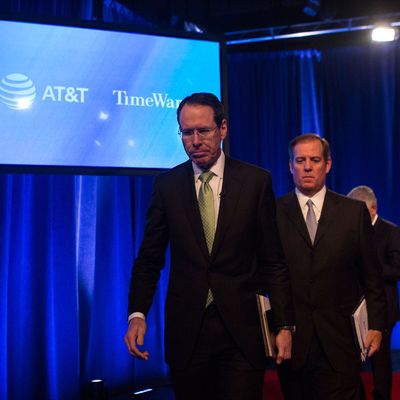
One of the main concerns the Department of Justice raised in their unsuccessful effort to block the AT&T–Time Warner merger was that a company that owned both a lot of the television channels Americans watch (CNN, TNT, HBO and more), and systems many Americans use to get television channels (DirecTV and U-Verse), would have undue power to raise prices and withhold content.
Of course, the president had some concerns of his own — but whatever his political motivations, there was a plausible case that the merger was harmful to consumer welfare, and could lead to higher prices and reduced availability of content.
And now that the merger has gone forward, HBO has gone dark for Dish Network customers, because of an impasse between AT&T and Dish Network over the terms on which AT&T will sell HBO access to Dish.
It’s not necessarily the case that AT&T is seeking unfair advantage in its negotiations with Dish Network. A representative for HBO told Bloomberg News they offered Dish an extension of HBO service on their preexisting terms while negotiations continued, and that Dish rejected the offer.
Bloomberg also notes that “Dish has been particularly aggressive lately in negotiations with programmers.” Univision, not part of any recent mega-merger, has been missing from Dish systems for months because of a similar dispute.
Still, the fact that millions of Americans who wanted to subscribe to HBO are now without access will reasonably raise concerns that the government was right about how media-telecommunications mergers may hurt consumers.
The primary concerns relate to negotiations over carriage fees. These fees are one of the main ways the companies that own television channels make money: If you own a cable or satellite system and you want to offer CNN or TNT to your subscribers, you have to pay a monthly, per-subscriber fee to AT&T.
Of course, the most popular channels (like CNN and Disney’s ESPN) command the highest fees.
When cable channels and cable and satellite systems are separately owned, negotiations over carriage fees are relatively straightforward. Channel owners want high fees and cable and satellite systems want to pay low fees, but if they can’t reach a deal about fees and a channel falls off a cable system, everybody loses: Viewers switch to other channels, and subscribers may jump to other systems. That provides both sides a strong incentive to strike a fair deal.
But when one company owns both channels and distribution systems, the incentives can become misaligned. If AT&T holds out for especially high fees for its channels, it may get what it asks for. Or, if it doesn’t, it can still win: Subscribers to systems that didn’t reach a deal to carry AT&T’s content might switch to AT&T-owned DirecTV so they can see their favorite shows.
This dynamic isn’t only important for shareholders in media and telecommunications companies. If a merged company gains added power in the market to charge higher prices to cable systems, that’s ultimately likely to flow through as higher prices for cable subscribers.
AT&T proposed a remedy for this concern during the litigation over its merger: “baseball-style” arbitration, where negotiations over fees to carry its channels could be submitted to a neutral arbitrator, who would approve the most reasonable terms proposed by either AT&T or the cable and satellite companies it sells content to. But the government rejected this offer.
The HBO blackout may just be because of a specific negotiating style at Dish Network. But consumers will need to watch and see whether there are more disruptions.
*Disclosure: Since I am writing about telecommunications, I should note that I am a paid contributor to MSNBC and NBC News, which are owned by Comcast, which is a merged media-and-telecommunications company similar to and in competition with AT&T-Time Warner. NBC exercises no editorial oversight over my writing for New York.





























